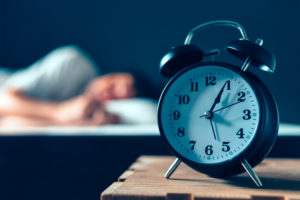
OK, a show of hands now: How many of you sleep through your alarm clock going off? You just never hear it or you hear it, all right, hit the buzzer and head back to dream land.
How long you remain there has a lot to do with what you do for a living and your satisfaction with the job, said the sleep experts at Best Mattress Brand.
People in industries like the arts, entertainment and recreation ”“ which may have later and more flexible hours ”“ stay in bed the latest past the alarm at 14 minutes, while those who stay in bed the least number of minutes seem to be working in more structured, physical fields such as transportation, warehousing and homemaking (eight minutes); and construction and manufacturing (seven minutes) ”“ all of which require you either to punch”¯a clock or get kids off to school and activities or maybe even walk a dog.
Health care, finance, insurance and technology all stand at an average of 11 minutes of lying-in bed after the alarm, while those in government, public administration, education, wholesale and retail take in an average 10 minutes.
Not surprisingly, those who love their work stay in bed less time after the alarm rings, nine minutes, while those who are not so in love with their work stay in bed 11 minutes.
Income was not really a factor. Those who make less than $10,000 a year stay in bed 11 minutes ”“ just one minute more than those earning $75,000 to $99,999 a year.
Indeed, the primary reason for staying in bed had nothing to do with work or earnings but rather with the bedroom”™s temperature (39% of respondents). The room”™s lighting was a close second at 34%. Hey, who wants to get up on a cold, dark winter morning unless Santa”™s waiting?
The quality of the room notwithstanding, a Best Mattress Brand spokesperson said: “The data, which are the results from a survey conducted on 1,060 people, show clearly that what you do for a living will influence your morning routine; and while (this is) not necessarily the number-one reason for why we act a certain way once awake, it is important to underline that to find similar patterns is very interesting, as it shines a light on the way our jobs are a huge part of our life even when we”™re not at work.”
The study also looked at the time it took to get ready for work, with government and public administration workers taking the most time, 42 minutes ”“ presumably because they have a dress code and are in the public eye ”“ while those who work in transportation and warehouses, fields in which you have to move a lot of stuff quickly, took only 33 minutes.
It’s fascinating to note that homemakers took 40 minutes to get ready in the morning, right behind educators (41 minutes) and those preening government workers. Not everyone is just throwing on yoga pants to stay at home.






















